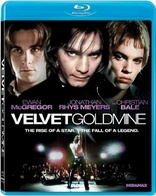Velvet Goldmine Blu-ray Movie
HomeVelvet Goldmine Blu-ray Movie 
Lionsgate Films | 1998 | 119 min | Rated R | Dec 13, 2011Movie rating
6.7 | / 10 |
Blu-ray rating
| Users | 3.0 | |
| Reviewer | 4.0 | |
| Overall | 3.8 |
Overview
Velvet Goldmine (1998)
In 1984, British newspaper reporter Arthur Stuart is investigating the career of 1970s glam rock star Brian Slade, who was heavily influenced in his early years by American rock singer Curt Wild, whose show was quite crazy for his time.
Starring: Jonathan Rhys Meyers, Ewan McGregor, Christian Bale, Toni Collette, Eddie IzzardNarrator: Janet McTeer
Director: Todd Haynes
| Drama | Uncertain |
| Music | Uncertain |
| Period | Uncertain |
| Comedy | Uncertain |
Specifications
Video
Video codec: MPEG-4 AVC
Video resolution: 1080p
Aspect ratio: 1.78:1
Original aspect ratio: 1.85:1
Audio
English: DTS-HD Master Audio 5.1 (48kHz, 24-bit)
Subtitles
English, Spanish
Discs
25GB Blu-ray Disc
Single disc (1 BD)
Playback
Region A (C untested)
Review
Rating summary
| Movie | 3.5 | |
| Video | 3.5 | |
| Audio | 5.0 | |
| Extras | 2.5 | |
| Overall | 4.0 |
Velvet Goldmine Blu-ray Movie Review
Are those spiders from Mars in your pocket, or are you just glad to see me?
Reviewed by Jeffrey Kauffman December 10, 2011Has Elvis really left the building? When an Elvis tune came on the radio the other day, my younger son asked me, “Dad, why do so many people believe that Elvis is still alive?”, and I had to admit I didn’t really have a good answer, other than that some people have such a strong identity with their music (or other) idols they don’t want to admit that those people are actually human, therefore mortal. It’s odd that someone like Elvis would lead to such massive conspiracy theories supposedly “proving” he’s still among us, perhaps working at the local Starbucks, while another massive icon of 20th century rock, Paul McCartney, was similarly “proven” to be dead in the late sixties, in yet another weird example of groupthink eschewing any semblance of logic. There have been at least a few films dealing with exposés of mysteries surrounding the rock lifestyle. Two somewhat similarly plotted films in this exclusive subgenre are 1985’s Eddie and the Cruisers and 1998’s Velvet Goldmine. Both films involve journalists investigating mysterious disappearances of rock stars of yore, and both films failed to find a very large audience in their initial theatrical exhibitions, despite having intriguing premises and the supposed allure of showing the inner workings of rock superstardom. If Eddie and the Cruisers tried to trade in on a sort of faux evocation of Bruce Springsteen and The E Street Band, Velvet Goldmine reached back to the glam rock days of David Bowie, Iggy Pop and Lou Reed. The film is a relatively early effort from writer-director Todd Haynes (Far From Heaven, the recent miniseries adaptation of Mildred Pierce), and it features a trio of interesting performances by Jonathan Rhys Meyers (who ironically portrayed Elvis in a made for television movie), Christian Bale and Ewan McGregor. The film includes some typical Haynesian explorations of sexuality and perception versus reality, all within the confines of an iconoclastic movement in the world of rock and roll.
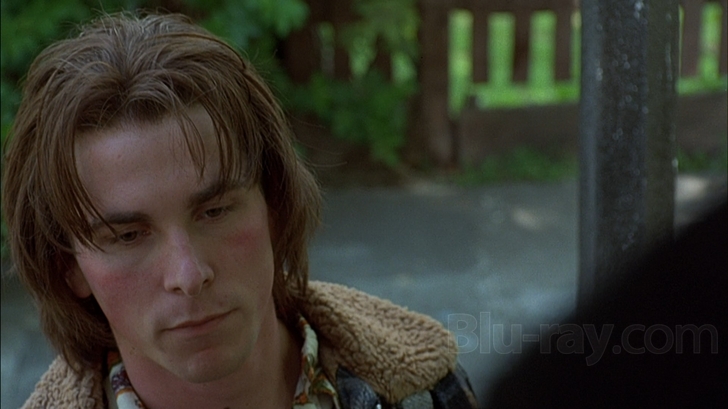
Haynes was seen as having put his own neomodern spin on the films of Douglas Sirk with Far From Heaven, and there’s little question, as odd as it may sound, that Haynes is revisiting Orson Welles with Velvet Goldmine, specifically Welles’ Citizen Kane. As with Kane, we’re offered a central mystery about a focal character, and a journalist sets off to visit several people who knew the character. When you add in little addenda like a manager sitting in a wheelchair or a sodden, destitute ex-wife as two of the interview subjects, the analogy becomes clearer. Haynes, in his incredibly detailed commentary included on the Blu-ray, tries to at least partially shrug off the Kane connection, seeing it as perhaps more tangential than “outside” observers will. In other ways, though, Velvet Goldmine is most definitely its own weirdly original creature, one which explodes with flashy exuberance (as befits its glam-rock subject matter) and which plays with storytelling conventions in some interesting ways.
Haynes is “out and proud” (and a current resident of my hometown, Portland), and Velvet Goldmine seems to be his perhaps overly rosy view of a defining moment in the sexual revolution, when “standard” norms were forsaken, an era which celebrated (to quote that old libertine, Cole Porter) “anything goes”. Were the seventies really like that? I’m perhaps a bit too young (a bit) to adequately remember, but it seems like the sixties were the free love era and despite the emergence of glitter rock, the seventies were by and large a much more repressed decade. But for Haynes they stand as the paradigm for a new freedom of thought and behavior, and while that may not be historically accurate (and Haynes in his commentary is positively defiant that he never wanted Velvet Goldmine to be historically accurate), it gives the film a powerful ambience, albeit one that may come off as slightly screed-like to some.
The basic plot of Velvet Goldmine finds journalist Arthur Stuart (Christian Bale) assigned to find out what happened to iconic glam rocker Brian Slade (Jonathan Rhys Meyers), whose mysterious disappearance from the music business ten years previously followed a disastrous public relations misstep which is detailed early in the film. It turns out Arthur was a big fan of Slade (who also went by the stage name Maxwell Demon, a winking reference to Bowie’s alter ego of Ziggy Stardust, as well as a perhaps bizarre link to a thought experiment in philosophy and thermodynamics). The film therefore ping pongs back and forth between the dystopian “current” time of the eighties (obviously modeled at least somewhat on Orwell’s 1984) and the memories of a decade before, when Arthur was trying to come to grips with his own ambivalent sexuality even as Brian Slade was poking the staid morés of British culture with his eyeliner, platform heels and glitter makeup.
The 1970’s era sequences also detail the love affair cum professional recording history of Brian and one of his idols, American rocker Curt Wild (Ewan McGregor). Wild is a washed up heroin addict when Slade manages to meet him during one of Brian’s U.S. tours, and Brian instantly falls in love, wanting to help resurrect Curt’s career, while Brian’s mendacious manager (Eddie Izzard) sees lucre in the pairing. Brian’s wife Mandy (Toni Collette) is almost a fashion accessory, watching Brian enter into assignations with both men and women as she looks on relatively helplessly.
While the film is an in your face extravaganza of music and outlandish performances (one strangely prescient in a way of Baz Luhrman’s Moulin Rouge, which of course also starred McGregor), dramatically the film lurches and stumbles, never developing characters enough to provide motivation or to even make sense some of the time. Oddly, it’s like watching the seventies through the haze of hallucinogenic drugs, which may in fact be apt, but which keeps the viewer at arm’s length from any emotional attachment to any of these characters. A number of plot points are never adequately addressed, which I won’t overly detail here to prevent spoilers being revealed, but the “solution” to the central mystery of what happened to Brian Slade seems especially ill conceived if one pauses to think about it for even a minute.
Despite its dramatic incoherence, Velvet Goldmine is a riot of style and a fascinating film to compare to some of Haynes’ more “in the box” efforts. Characters sing at the drop of a hat, animations appear in various people’s eyes, the film seems only tenuously balanced between its depiction of “real life” (such as it is in this film) and “pretend”, and the whole fantasy element of Oscar Wilde being the Godfather as it were of the whole glam rock (read gay rights) movement sends Velvet Goldmine spinning almost out of control some of the time. Haynes is deliberately self-reflexive throughout almost every moment of this film (he actually mentions in his commentary about how he had to refer to several websites which have obsessively documented the film’s many references in order to adequately prepare for the commentary track). While some of those are extracurricular, as it were (the Wilde subplot), Haynes isn’t above “quoting” himself, as in one odd little moment when Brian and Curt are shown as modified Barbie (Ken?) dolls, obviously evoking Haynes’ controversial “biographical” short about Karen Carpenter, Superstar, where most of the action is performed by Barbie dolls.
Velvet Goldmine is one of those films which may in fact not make a whole lot of sense, and which is perhaps too fanciful a “re-creation” of a supposed timeframe for its own good, but which is inerrantly entertaining nonetheless. With a stellar cast (many in early roles before they vaulted to current day stardom) and Haynes’ colorful directorial touches, the film is completely unique, for better or worse. With a virtual nonstop soundtrack of classics from the era it supposedly is portraying, as well as newly composed pieces, Velvet Goldmine often plays like a longform music video. It may be nothing like the times it seeks to evoke, but sometimes fiction can be stranger (and more entertaining) than truth.
Velvet Goldmine Blu-ray Movie, Video Quality 
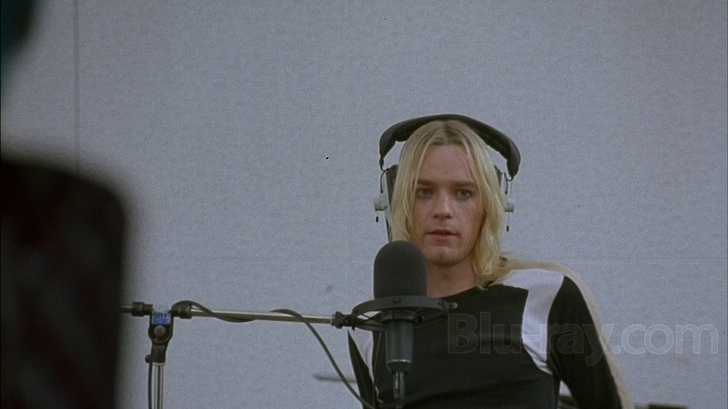
Velvet Goldmine is presented on Blu-ray courtesy of Lionsgate/Miramax with an AVC encoded 1080p transfer in 1.78:1. This hugely colorful film really pops nicely in this new high definition presentation, with a bold and bright palette which offers really excellent saturation and robustness. On the negative side, the overall look of the film is disappointingly soft a lot of the time, especially in midrange and far range shots, some of which are positively blurry (see Bale's face on screencap 5 for a good example). Grain can tend to approach digital noise levels in some of the darker sequences (and even in some of the brighter scenes, as you can see from some of the screencaps). Fine detail is generally well above average, especially in close-ups, though some of the film's concert sequences suffer from gauziness and inconsistent black levels. While the bulk of this transfer is artifact free, there is one recurrent issue with the many pinstripe suits that a number of the male character wear, with slight shimmer and aliasing disrupting the vertical lined patterns of the apparel. There's some very minor haloing in a couple of sequences, notably on backlit close-ups of faces.
Velvet Goldmine Blu-ray Movie, Audio Quality 
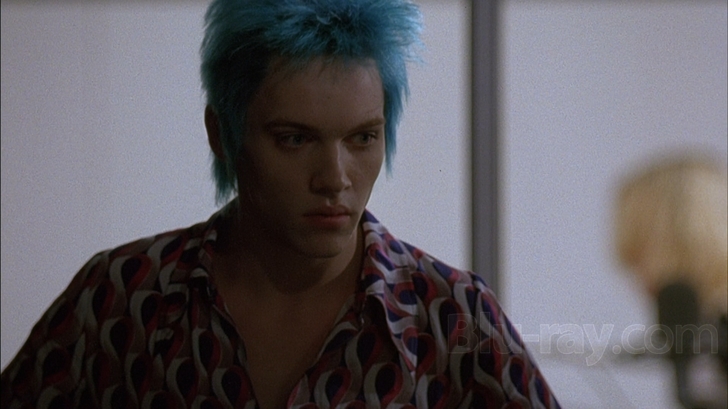
Velvet Goldmine's lossless DTS-HD Master Audio 5.1 mix is a wonder to listen to, and it's no wonder that Haynes is inordinately proud of the soundtrack to his film (he has a great line in his commentary about how some may dismiss the film itself but no one can complain about the [insert expletive here] fine soundtrack). As mentioned above in the main body of the review, Velvet Goldmine is a virtually nonstop compendium of fantastic music, some of it actual "relics" from the glam rock era, and other, newer material that was written expressly for the film. McGregor did all of his own singing here (as he did in Moulin Rouge) and Meyers evidently did at least some of his own, but even putting aside their contributions, the slashing, burning, bass and drum heavy work of the bands involved means that Velvet Goldmine's lossless track gets a consistent workout, especially with regard to the lower end. There's excellent immersion throughout this track, obviously with the music, but with nice ambient crowd noises in the many concert scenes as well. Fidelity is spot on, clear and precise with beautiful reproduction through all frequencies. Dynamic range is actually surprisingly wide, including everything from relatively quiet dialogue scenes between Bale and Collette to the head banging music segments.
Velvet Goldmine Blu-ray Movie, Special Features and Extras 
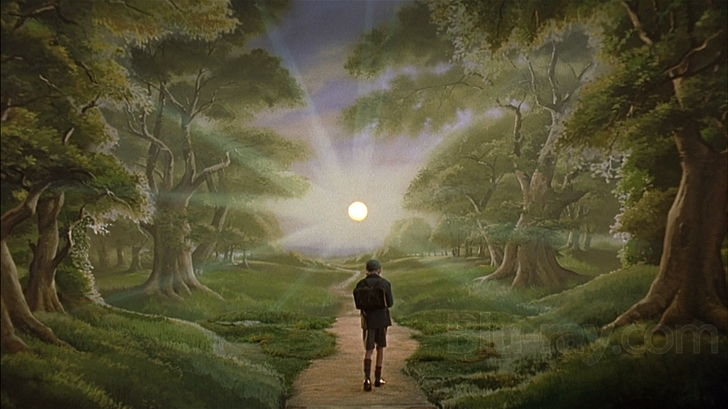
- Feature Commentary by Writer-Director Todd Haynes and Producer Christine Vachon. This is one of the most almost obsessively detailed commentaries in recent memory, one that goes into incredible detail, often rather über- intellectually, but which nonetheless manages to be entertaining, if a bit dry. (It often seems like Haynes is reading from prepared notes; his delivery is far from conversational a lot of the time). Vachon doesn't have a lot to offer here, other than occasional additions to Haynes' insights, but Haynes both analyzes and defends his film and provides a lot of background on what he was thinking and attempting to accomplish. He also gives a lot of details on the film's many references, which may be the most interesting thing to a lot of listeners.
- Theatrical Trailer (SD; 1:43)
Velvet Goldmine Blu-ray Movie, Overall Score and Recommendation 

Velvet Goldmine may not in fact be history (and Haynes insists it shouldn't be viewed as such), but it is hugely entertaining almost all of the time. When seen more as a commentary, almost an impressionistic evocation of an era, rather than an outright "document" of what it was like then, the film is able to overcome its dramatic and logical flaws. Performances are amazing and Haynes' directorial craft is fun and outlandish, perfectly in tune with the times he's attempting to portray. Haynes' commentary on this Blu-ray is one of the most fascinating in recent memory and may be worth the price of admission alone. Recommended.
Similar titles
Similar titles you might also like

24 Hour Party People
2002

Nashville
Paramount Presents #24
1975

Almost Famous 4K
2000

Rockers 4K
1978

Vinyl: The Complete First Season
2016

Her Smell
2018

A Face in the Crowd
1957

Prey for Rock & Roll
2003

10,000 Saints
2015

Rudderless
2014

New York, New York
1977

Sid & Nancy
1986

Bamboozled
2000

Hedwig and the Angry Inch
2001

Treme: The Complete Second Season
2011

American Graffiti 4K
50th Anniversary Edition
1973

Aria
30th Anniversary Edition
1987

Inside Llewyn Davis
2013

Mo' Better Blues
1990

Privilege
1967
